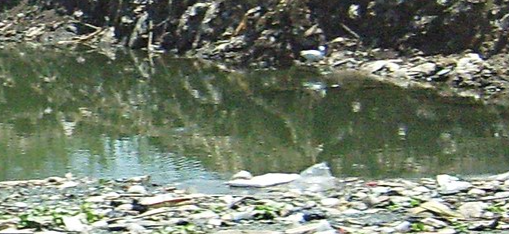'Informal' does not mean 'irrelevant' but always overlooked in discussions around these settlements is the expertise of the "deliberately silenced or the preferably unheard" -
Some insight centering voices of the marginalized in the garbage politics (pun intended) of Karachi:
Some insight centering voices of the marginalized in the garbage politics (pun intended) of Karachi:
Background: the urban city floods during monsoon season, we diagnose it as a nullah (drain) issue, someone has to take the fall, it's the poor people housed 'informally'
For more details read @MahimMaher and @SohailRabKhan's report: https://www.samaa.tv/news/2021/01/filthy-rich-a-karachi-sewer-operation-for-a-sick-city/
For more details read @MahimMaher and @SohailRabKhan's report: https://www.samaa.tv/news/2021/01/filthy-rich-a-karachi-sewer-operation-for-a-sick-city/
Will a focus solely on nullahs solve anything long-term? Some experts have repeatedly negated this. The problem isn't just the flow of sewage and stormwater but the city's garbage production and incapable management of it.
There's a part of this interview by @MahimMaher (4:40 - 5:20) where two residents discuss their behaviour as it pertains to garbage disposal in the nullah. They disagree on how far waste drop-off containers are situated: one cites 2-4 km, other < 2 km.
https://www.youtube.com/embed/yJdnA5Gy4ZA
https://www.youtube.com/embed/yJdnA5Gy4ZA
The number is trivial as both distances are unacceptably far away for waste disposal. The cleanliness 'abroad' that we crave is achieved due to an elaborate system of garbage pick-up at your door or at appropriately walkable drop-off sites. That's the government's job.
Expecting citizens to walk to a drop-off point has to be rooted in reality. When is the last time you walked 1-4 km in Karachi's heat? Carrying a bag of waste?
Consider walkability standards across the world: the max distance falls at 800 m or a 10 minutes walk.
Consider walkability standards across the world: the max distance falls at 800 m or a 10 minutes walk.
We should not pollute, but approach this with a nuance: does the urban design make this behaviour inevitable? In this case, yes.
Having citizens internalize entire blame for management failures is perverse.
Having citizens internalize entire blame for management failures is perverse.
Even the design of containers matters as it influences behaviour. Remember the marine life-shaped bins installed at Seaview?
Listen to a snippet from an interview I conducted with four university-going students for a different topic: https://soundcloud.com/itsnotrida/snippet-function-of-bins-at-seaview
Listen to a snippet from an interview I conducted with four university-going students for a different topic: https://soundcloud.com/itsnotrida/snippet-function-of-bins-at-seaview
They were dismayed at garbage not reaching its proper destination but again, observe with a nuance. Do you use a garbage container with holes in it? Don't those empty structures look like public art?
Most of the time the simple solution is sufficient. https://tinyurl.com/yxdfqxpl
Most of the time the simple solution is sufficient. https://tinyurl.com/yxdfqxpl
(Does anyone else see the symbolic irony of throwing garbage in the mouths of the same marine-life these bins were aiming to protect from digesting plastic pollution?)
Returning back to the garbage at the nullahs- listen to Abdul Rehman's analysis in an interview by @MahimMaher: https://twitter.com/SAMAATV/status/1351501078261596168?s=20
Lots to unpack, from caste, class, labour, to political collateral- not something you can derive from any map. Interviews like these are integral in the understanding of how our urban functions. The essential service of recycling benefits the whole city!
Why is recycling an essential service to the city? Long story short: lots of garbage, nowhere for it to go, recycling helps reduce the impact of bad management of waste by the city's administrators.
@UrbanPlannerNED discusses garbage and capacity crisis: https://twitter.com/KarachiUrbanLab/status/1352313080378757121?s=20
@UrbanPlannerNED discusses garbage and capacity crisis: https://twitter.com/KarachiUrbanLab/status/1352313080378757121?s=20
While the city tears down those seemingly in the way of cleanliness in the city, shouldn't they also recognize and reward the ones making it cleaner 'informally'? Provide adequate facilities and health benefits to these labourers. They're integral.
Takeaway: After the city floods the discourse from the top magnifies all problems towards folks in settlements alongside nullahs, not their own negligence, to distract us calling for their resignations with an 'us vs katchi abadis' situation.
Remain mindful.
Remain mindful.
Another takeaway: there are experts in every walk of life. What are your thoughts? Do you have neighbourhood level insight that is overlooked?

 Read on Twitter
Read on Twitter



